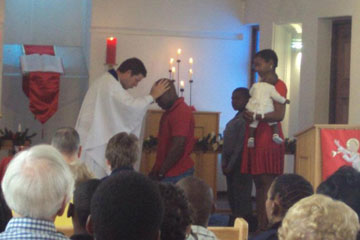 Many people are disenchanted with the traditions of their churches, seeing their services as full of empty words, and they are apt to throw out external practices of worship because they don’t want to be hypocritical in saying things they don’t mean. However, a teaching emphasized in the New Church is that these rituals can be powerful to the degree that we bring intention into action. Here are explorations of the most common rituals and ceremonies you’ll see in New Church congregations and their significance.
Many people are disenchanted with the traditions of their churches, seeing their services as full of empty words, and they are apt to throw out external practices of worship because they don’t want to be hypocritical in saying things they don’t mean. However, a teaching emphasized in the New Church is that these rituals can be powerful to the degree that we bring intention into action. Here are explorations of the most common rituals and ceremonies you’ll see in New Church congregations and their significance.
Baptism
Baptism is a tangible reminder that people may receive faith and be saved if they choose to live according to the Lord’s rules instead of from their own lower inclinations. When it is a baby being baptized, the service is also for the parents, who are making a commitment to bring this child up according to the Ten Commandments. The waters of baptism represent a spiritual washing that occurs when the Lord’s truth cleanses our actions, thoughts, and will (New Jerusalem and its Heavenly Doctrine 202-207).
Holy Supper
By our very creation we are in relationship with the Lord, and to cultivate and nurture that relationship we continue to practice repentance (shunning evils and doing good). The Holy Supper is a time to reflect on what we’ve been struggling with, admit the ways in which we’ve sinned, ask for the Lord’s forgiveness, and be receptive to His help. In the Word, the Lord set the example of a new way to keep the Passover by giving bread and wine to His disciples, and saying “This is My body which is given for you; do this in remembrance of Me…This cup is the new covenant in My blood, which is shed for you” (Luke 22:19-20). The bread and wine are not physically flesh and blood, but they represent the Lord’s Divine substance. Eating the bread corresponds to taking the Lord’s love into our lives, while drinking the wine corresponds to accepting His wisdom. We’re essentially saying that we accept the Lord’s wishes and instructions for our lives: we are willing to make them a part of us, just as bread and wine become a part of us through our digestive systems.
Betrothal
Betrothal is a ceremony for a couple before their marriage ceremony. It is often just the couple and a priest, or accompanied with a close circle of family and friends. The couple looks to a marriage of their minds and spirits in preparation for the complete joining together that takes place when they marry. “By betrothal the mind or spirit of one is made ready for union with the mind or spirit of the other, or to say the same thing, the love of one with the love of the other” (Married Love 302:1).
Wedding
A wedding is a ceremony uniting two people who love each other, followed by food and celebration of that union. The purpose of the effort of both families into putting on a wedding and inviting witnesses serve as reminders and support for the couple when they hit hard times. And the Lord promises, “They who so dwell together on earth dwell together as angels after death” (Secrets of Heaven 2732).
Resurrection Service
This service acknowledges our grief over our loss of loved ones while celebrating their lives on earth and their continuing lives in heaven. In Luke, the Lord says to the repentant thief on the cross beside Him, “Today you will be with me in paradise” (Luke 23:43). Resurrection into the other world happens at once. Because of this, the emphasis is not on a person’s body, which was merely a temporary house for their spiritual body. In a memorial service, family and friends, uplifted by the accompanying readings and beautiful music, think about the contribution that person made to others, and get a chance to reflect themselves on the reality of eternal life.
Confession of Faith (also known as ‘Confirmation’)
A person who was baptized as a child may choose to declare publicly his or her faith as an adult. They read a confession of faith that acknowledges the Lord Jesus Christ as the one God of heaven and earth, accepting the responsibility for themselves to shun evils as sins and do good (True Christianity 1, 2). They may choose to share passages from the Word that are particularly dear to them.

